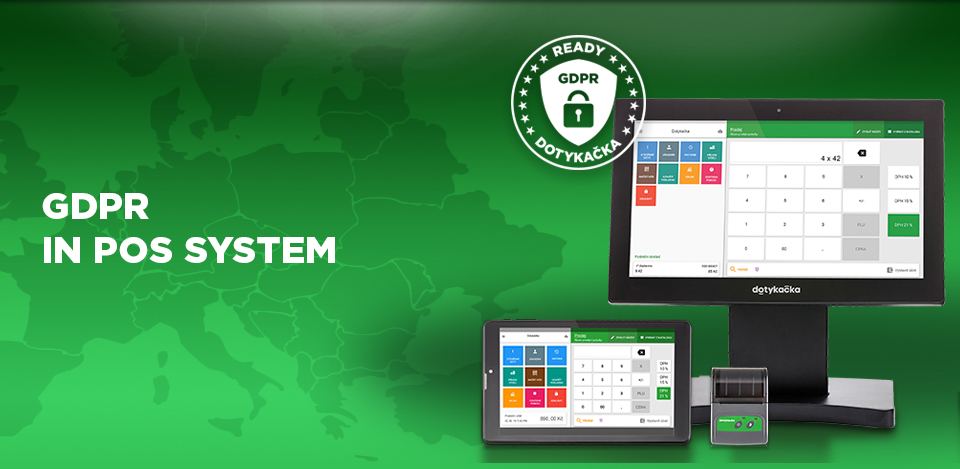GDPR and Dotykačka


The new General Data Protection Regulation, known as GDPR, comes into force on May 25, 2018. For us, this regulation does not change anything because all personal data has been and will continue to be safe with Dotykačka, and our customers do not need to take any action in relation to it. You can find all important information in the general announcement below. See also GDPR features in Dotykačka.
Dotykačka ČR s.r.o is the controller and also processor of personal data that you, as a data subject, provide to us. The protection of personal data is very important to us, therefore we always process personal data in accordance with the legal regulations.
Our General Privacy Policy governs the use and storage of personal data. You can learn about our privacy policy in the General Privacy Policy document.
We may collect the following types of personal data about you:
We need your personal data in order to:
You personal data is processed by Dotykačka ČR s.r.o. in the Czech Republic. The processing and storage of data is done through cloud services located in the Czech Republic or the EU.
No third parties have access to your personal data unless expressly required by law.
According to Czech and European law, we are obliged to keep documents for 10 years after the termination of the relationship, as stated in our Privacy Policy. After this period, your personal data will be irreversibly destroyed. Any personal data that we have available to provide marketing or information services will be retained until you notify us that you no longer wish to receive such information/services. For more information about how we handle personal data, please see our Privacy Policy.
If you believe that any of your personal data that we process is incorrect or incomplete, you may request to view, correct, or delete your personal data. Please contact us through our email address gdpr@dotykacka.cz or through our data box.
If you wish to object to the way we have processed your personal data, please contact our Data Protection Officer at dpo@dotykacka.cz or in writing to Dotykačka ČR s.r.o., Plzeňská 3217/16, 150 00 Prague 5, Czech Republic. Our authorized employee will deal with your objection and will work with you to resolve it.
If you still feel that your personal data has not been handled appropriately according to the law, you can contact the Office for Personal Data Protection and file a complaint.

The activities required by the GDPR legislation are available directly in the cash desk and in Dotykačka Cloud. This includes in particular customer anonymization and GDPR audit for access to the personal data of your customers.
The Office for Personal Data Protection has compiled the ten most common mistakes or misleading claims on the General Data Protection Regulation (GDPR).
Liable subjects that violate the GDPR rules, are non-compliant or unprepared for the new regulation, may face significant fines that can even be liquidating.
The maximum fine is € 20,000,000 or 4% of the company’s global annual turnover (whichever is higher), and its amount will depend on a number of factors, such as the nature, severity, and duration of the violation, the number of injured citizens, the extent of the damage, and many more, irrespective of the size of the subject. A high fine may be imposed on a smaller company with ten employees as well as on a large multinational corporation.
In addition to imposing administrative fines, controllers or processors of personal data may be exposed to actions brought by natural persons claiming material or non-material damages. Last but not least, companies are exposed to a loss of trust due to the mishandling of personal data.
GDPR – calculator and training
If you already feel overwhelmed with the masses of theoretical information about the GDPR and still do not know how to deal with it in practice, you can visit one of the practical all-day training courses that are currently available on the market, or fill in one of the online GDPRcalculators to guide you quickly through the GDPR requirements tailored to your company.